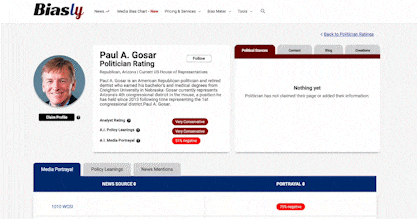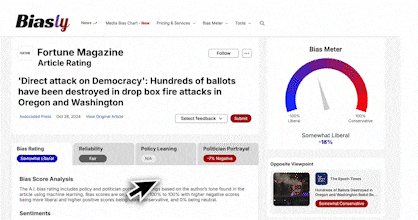Senate GOP Plows Ahead With Budget Plan After Trump Backs Rival House Version
- Bias Rating
44% Medium Conservative
- Reliability
50% ReliableAverage
- Policy Leaning
50% Medium Conservative
- Politician Portrayal
11% Positive
Continue For Free
Create your free account to see the in-depth bias analytics and more.
Continue
Continue
By creating an account, you agree to our Terms and Privacy Policy, and subscribe to email updates. Already a member: Log inBias Score Analysis
The A.I. bias rating includes policy and politician portrayal leanings based on the author’s tone found in the article using machine learning. Bias scores are on a scale of -100% to 100% with higher negative scores being more liberal and higher positive scores being more conservative, and 0% being neutral.
Sentiments
-17% Negative
- Liberal
- Conservative
| Sentence | Sentiment | Bias |
|---|---|---|
Unlock this feature by upgrading to the Pro plan. | ||
Reliability Score Analysis
Policy Leaning Analysis
Politician Portrayal Analysis
Bias Meter
Extremely
Liberal
Very
Liberal
Moderately
Liberal
Somewhat Liberal
Center
Somewhat Conservative
Moderately
Conservative
Very
Conservative
Extremely
Conservative
-100%
Liberal
100%
Conservative

Contributing sentiments towards policy:
62% : "We need both Chambers to pass the House Budget to 'kickstart' the Reconciliation process, and move all of our priorities to the concept of, 'ONE BIG BEAUTIFUL BILL,'" Trump said. Senate Republicans, however, are unfazed by Trump's rejection of their plan.59% : "[Medicaid] is on the table," said House Appropriations Committee Chairman Thomas Jeffrey "Tom" Cole (R-Okla.) to The Epoch Times at his conference's policy retreat in Doral, Florida, on Jan. 29.
57% : Senate Majority Leader John Randolph Thune (R-S.D.) has said that he seeks to make the TCJA's reductions of tax rates "permanent," which could cost as much as $4.5 trillion.
53% : Trump has endorsed the House's approach.
47% : Trump wrote on Truth Social, his social media platform, making reference to Senate Budget Committee Chairman Lindsey Graham (R-S.C.) who is spearheading the Senate's plan.
44% : Reconciliation bills can only affect taxation, spending, and public borrowing -- thereby excluding pure policy changes, such as reforming immigration laws -- and must not increase the federal budget deficit after 10 years, known as the "Byrd Rule.
44% : In the House of Representatives, by contrast, Republican leaders have indicated that their conference can only, realistically, consider one reconciliation bill -- due to wide disagreements on levels of government spending and the conference's narrow 1-seat majority, meaning that two members could defeat a bill by joining Democrats in opposition.
37% : In order to comply with the Byrd Rule, the bill will need to make significant spending cuts -- raising fears that social programs such as Medicaid could be targeted, which would be politically damaging to some Republicans.
36% : The Republican Conference of the U.S. Senate will proceed with its own budget plan to fund President Donald Trump's policy initiatives, even after Trump himself rejected the plan on Feb. 19. To fund many of Trump's administrative and financial plans -- such as constructing a wall along the U.S. border with Mexico, removing all illegal immigrants from the United States, and extending provisions of the Tax Cuts and Jobs Act (TCJA) of 2017 -- Congress must enact new laws that authorize funding.
*Our bias meter rating uses data science including sentiment analysis, machine learning and our proprietary algorithm for determining biases in news articles. Bias scores are on a scale of -100% to 100% with higher negative scores being more liberal and higher positive scores being more conservative, and 0% being neutral. The rating is an independent analysis and is not affiliated nor sponsored by the news source or any other organization.

























 NTD
NTD


